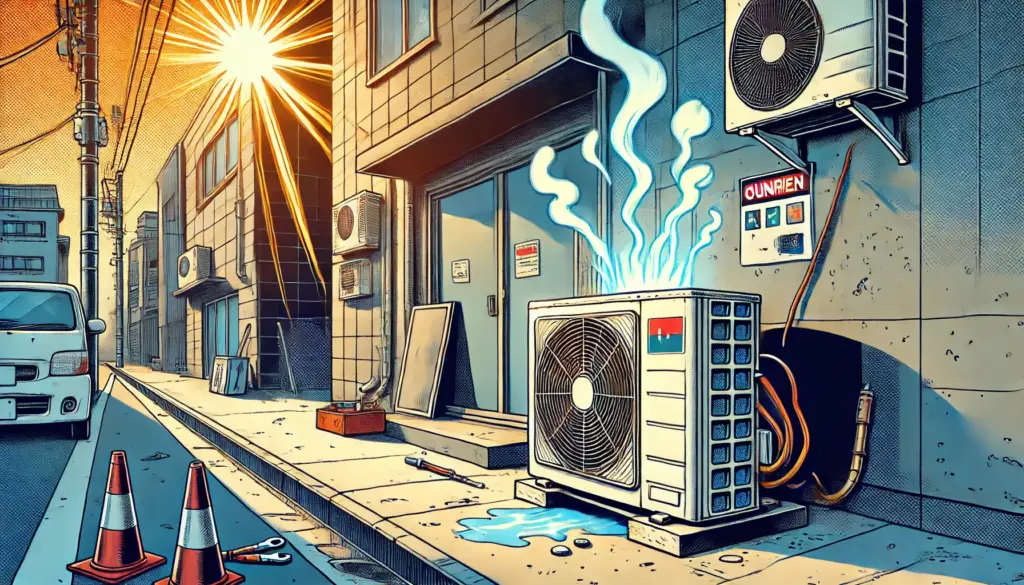
With Japan experiencing some of the hottest summers in its recorded history, air conditioner failures are becoming alarmingly common. From major cities to rural areas, residents are discovering their ACs suddenly stop cooling—right when they need them most. But why is this happening? And what can you do to prevent your own unit from failing?
Let’s explore what’s behind this silent crisis affecting homes across Japan 🇯🇵❄️🔥
🔥 A Summer Unlike Any Other
In recent years, Japan has seen summer temperatures exceed 40°C in multiple regions. Nights are no longer a source of relief either—so-called “tropical nights,” where temperatures don’t drop below 25°C, are now the norm in many cities. This relentless heat pushes home appliances, especially air conditioners, far beyond their normal operating limits.
As a result, more households are reporting sudden cooling failures, error codes, or complete system shutdowns. In most cases, the issue isn’t due to age or misuse—it’s the heat itself.
🧊 Why Air Conditioners Fail in Extreme Heat
1. Overheated Outdoor Units
The outdoor unit (室外機) plays a crucial role in releasing heat from inside your home. But when the temperature outside is extremely high, the unit can’t efficiently expel the heat. When it gets too hot, the system may trigger a safety shutdown to protect internal components—leaving you with no cold air.
2. Poor Airflow and Blocked Vents
Dust, dirt, and even nearby plants can obstruct airflow around the outdoor unit. When airflow is restricted, heat builds up faster than the fan can release it. Over time, this not only reduces performance but also shortens the lifespan of the unit.
3. Constant, Uninterrupted Usage
During a heatwave, air conditioners often run non-stop for days. This heavy load causes mechanical stress on parts like the compressor and fan motor. If the system doesn’t get enough downtime or maintenance, it’s more likely to fail.
4. Internal Component Failures
Air conditioners are sensitive machines. The following are common parts that fail under extreme conditions:
- Fan motors stop spinning due to overheating.
- Refrigerant leaks become apparent when the system struggles to cool.
- Control boards and sensors may malfunction or produce error codes.
- Four-way valves (used in reversible systems) can get stuck or fail, leading to the wrong air temperature mode.
❓ What Happens When an AC Breaks?
When an air conditioner fails during a heatwave, you might notice:
- Cold air no longer comes out of the indoor unit
- The outdoor fan isn’t spinning or is unusually loud
- The system frequently turns off and on
- You see flashing error codes on the control panel
- Airflow becomes weak or uneven throughout the room
In many cases, the indoor unit continues to run, making you believe everything’s fine—until you realize the room isn’t cooling at all.
🛠 What You Can Do to Protect Your AC
Even though you can’t control the weather, there are several steps you can take to keep your air conditioner running smoothly:
✅ Shade the Outdoor Unit
Provide a shade for the outdoor unit, but don’t block airflow. Use items like a sunshade, a plant screen, or even a parasol placed about 1 meter away.
✅ Keep It Clean
Check and clean your air filters regularly. Also inspect the outdoor unit for leaves, dirt, and other debris that could block the vents or fins.
✅ Use “Eco Mode” When Possible
Switch to energy-saving modes to reduce the system’s workload when you’re not in immediate need of high cooling power.
✅ Turn It Off During Peak Sunlight (If Safe)
If you’re away from home during the hottest part of the day, turn the unit off to avoid unnecessary stress. Use timers or smart plugs to control it remotely.
✅ Schedule Professional Maintenance
Before summer begins, have your AC inspected by a licensed technician. Replacing worn-out parts early can save you from a complete breakdown in mid-July.
💡 Personal Insight: The Hidden Cost of Delaying Repairs
Many households delay AC repairs due to cost or inconvenience—until it’s too late. But in a summer where temperatures reach 40°C or more, a failed AC isn’t just uncomfortable; it can be dangerous, especially for children, the elderly, and pets.
Think of air conditioning not as a luxury, but as essential infrastructure in a changing climate. Heatwaves are no longer “once-in-a-decade” events—they’re now annual threats.
🌱 Final Thoughts
Japan’s summer heat is becoming more intense, more prolonged, and more dangerous. As AC units across the country struggle to keep up, now is the time to prepare. By understanding why breakdowns happen and acting early, you can make sure your home stays cool and safe—even when the weather isn’t.
So, before the next heatwave strikes, ask yourself:
Is your AC ready to survive the summer?



















































